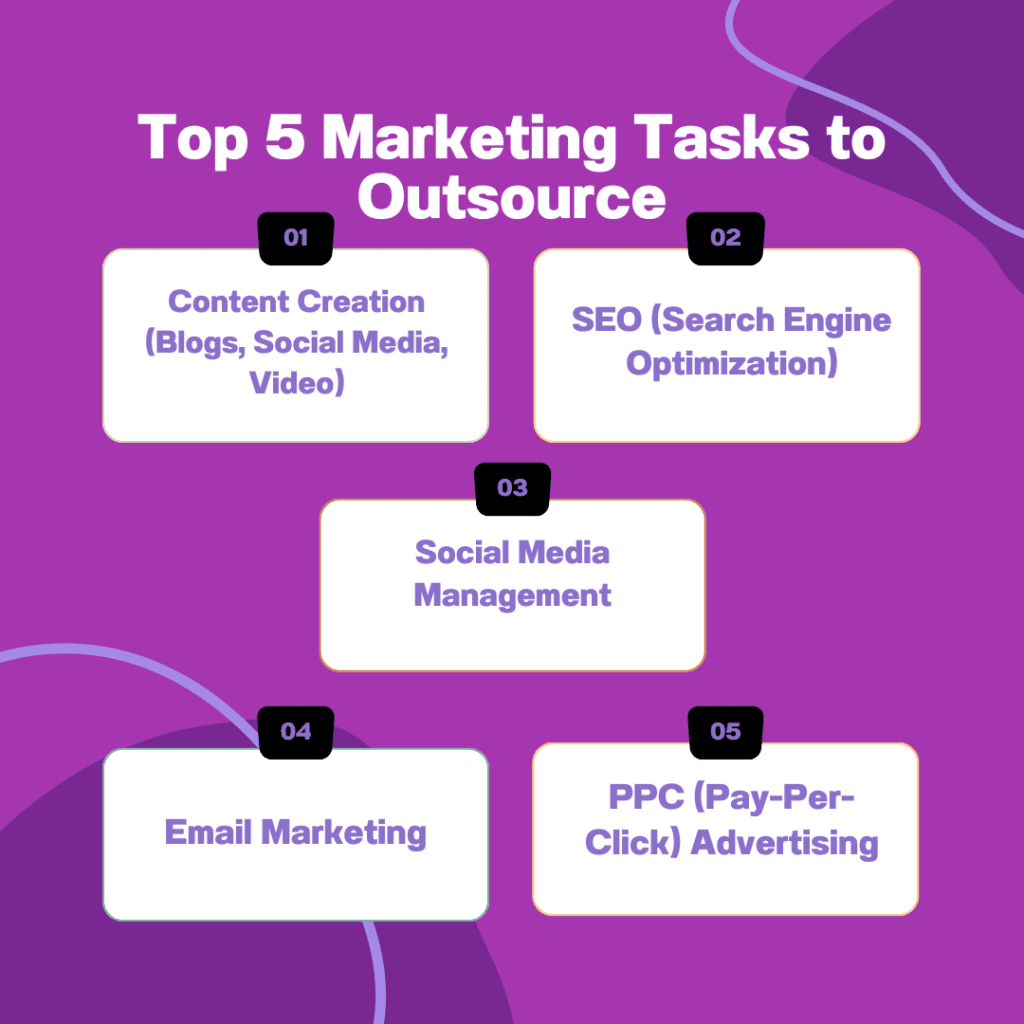Best Practices for Outsourcing Marketing Tasks
18 Jun 2024 By: Mary Dellosa
Updated

Outsourcing marketing tasks makes life easier for many businesses. By hiring experts, companies can focus on what they do best and let specialists take care of the rest.
Understanding the Basics of Outsourcing
Before you start outsourcing, it’s important to know what it involves. It means getting outside help for tasks you used to handle in-house, like website design, content creation, social media management, and SEO.
Defining Outsourcing in Marketing
Outsourcing in marketing means letting outside professionals or agencies handle specific tasks. This helps businesses benefit from specialists who bring fresh ideas, industry knowledge, and targeted strategies.
The Importance of Outsourcing Marketing Tasks
Outsourcing marketing helps businesses succeed in today’s fast digital world. Experts bring fresh ideas, know the latest trends, and create strategies to keep your business ahead. Outsourcing also saves time and resources. By letting experts handle marketing, businesses can focus on core tasks, boosting productivity and efficiency. This ensures smooth and successful operations.
In-house vs Outsource Spend Comparison Tool
Let’s use this spend comparison calculator to compare costs per inquiry for in-house and outsourced services.
Identifying Marketing Tasks to Outsource

When deciding which marketing tasks to outsource, businesses should assess their needs and priorities. Outsourcing is a smart move for companies wanting to improve marketing. Experts bring fresh ideas, industry insights, and boost efficiency by handling specialized tasks.
Evaluating Your Marketing Needs
Step back and review your current marketing strategies and goals. Identify areas where you lack expertise or where your team is stretched thin. Are there gaps that need specialized attention? Consider doing a thorough audit of your marketing activities. This can help you find areas to improve and decide which tasks to outsource for better results.
What part of marketing should you outsource?
First, understand your marketing needs. Then, prioritize tasks for outsourcing. This could include creating content, designing graphics, running PPC ads, managing email campaigns, or handling social media. Weigh the benefits of expert help against the costs. Consider the potential return on investment for each task. Focus on those that fit your marketing goals and budget.
Think about which tasks to outsource. Look for those needing special skills or tools you don’t have. Also, consider time-consuming or repetitive tasks. Outsourcing these frees up your team for more important work.
Partnering with outside experts brings new technologies and best practices to your business. This gives you a competitive edge. Their help keeps you on top of market trends and lets you create marketing campaigns that truly connect with your audience. Working with a team like the Webtonic performance-driven marketing agency is a practical way to scale your efforts and drive better results, without stretching your internal team.
When Should You Outsource Marketing?
- Limited In-House Expertise:
- If your internal team lacks specialized skills in critical areas like SEO, content creation, or digital advertising, it’s time to consider outsourcing. Rather than investing in training or hiring, outsourcing allows for immediate access to professionals.
- Rapid Growth or Scaling Needs:
- When your business is growing quickly and marketing needs are expanding beyond what your internal team can handle, outsourcing helps you scale without the need to immediately hire additional full-time employees.
- Tight Budgets:
- If hiring an in-house team is cost-prohibitive, outsourcing offers a cost-efficient alternative. You can work with freelancers or agencies on a project basis, making it easier to control expenses.
- Project-Specific Requirements:
- For short-term marketing projects like launching a new product, running a PPC campaign, or developing a website, outsourcing can provide the right resources without the long-term commitment of hiring full-time staff.
- Desire for Innovative Ideas:
- If you feel your in-house marketing efforts have become stagnant or need a fresh perspective, outsourcing can inject new ideas and strategies that are tailored to current market trends.
- Need for Consistent Output:
- If your business struggles to maintain a consistent flow of marketing content (e.g., blogs, social media posts, or newsletters), outsourcing helps keep production steady and on schedule.
Outsourcing marketing is most beneficial when your business needs immediate access to expertise, scalability, and consistent content without the overhead of building an in-house team. However, a balance must be struck to ensure external partners align with your brand and objectives.
Pros and Cons of Outsourced Marketing Services
Pros:
- Expert Skills:
Get access to specialists in SEO, content, PPC, and more without needing to train in-house. - Cost-Effective:
Outsourcing saves on hiring, salaries, and training costs by only paying for what you need. - New Ideas:
Fresh, outside perspectives can boost creativity and keep your marketing competitive. - More Focus:
Your team can focus on key business tasks while the outsourced team handles marketing. - Scalable:
Easily adjust the level of marketing support as your business grows.
Cons:
- Less Control:
You might have less direct control over daily marketing operations. - Communication Issues:
Time zones or unclear goals can cause communication gaps. - Quality Risks:
Quality can vary, so choosing the right agency or freelancers is crucial. - Brand Disconnect:
Outsiders may not fully understand your brand or audience, leading to less personalized content. - Dependency:
Relying too much on outsourcing can create risks if the partnership ends unexpectedly.
Choosing the Right Outsourcing Partner
Choosing the right outsourcing partner is crucial for good marketing. Find partners with the right skills, a solid track record, and who understand your goals. Agencies like The White Label Agency specialize in supporting marketing teams with scalable, high-quality services. Outsourcing can boost your marketing and help your business grow. The right partner will enhance your brand and drive growth. Take your time to find the best fit for a smooth collaboration.
Key Factors to Consider When Choosing a Partner
Look for a partner with industry experience and a proven track record. They should understand your target market and tailor strategies to your needs. Good communication, responsiveness, and cultural fit are also important.
Assess if they can scale with your business. You’ll want a partner who can grow with you and adapt to changing needs. A flexible partner offers long-term value and supports your growth.
Red Flags to Avoid in Outsourcing Partners
Avoid agencies or freelancers who promise unrealistic results or overnight success. Set realistic expectations and work with partners who are transparent and accountable. Choose those who are proactive, reliable, and have a strong reputation.
Check their data security measures and compliance standards. Protecting your sensitive information is crucial. Ensure they follow strict data protection rules and have strong security protocols. Trust is key in handling confidential data.
Managing the Outsourcing Process
Managing outsourcing well is key to success. When choosing an outsourcing partner, do thorough research. Get recommendations and evaluate their expertise, experience, and track record. Look for a partner who shares your values and has proven success. This sets the stage for a strong partnership.
Setting Clear Expectations and Goals
Talk openly with your outsourcing partner about your goals and expectations. Give them the details and brand materials they need to understand your vision. Set goals together. Agree on key goals and milestones. This way, you both understand what success looks like and can work towards the same targets.
Maintaining Communication and Collaboration
Regular communication is vital for successful outsourcing. Schedule check-ins to discuss progress, address concerns, and provide feedback. Encourage open communication to keep everyone aligned with your goals.
Use project management tools to streamline communication. These tools help with real-time updates, document sharing, and task tracking, making the process more efficient and transparent.
Trending Now
Outsourcing marketing helps businesses focus on their core activities by letting experts handle tasks like content creation and social media. This saves time and money while ensuring high-quality, professional marketing efforts
It lets businesses focus on what they do best while experts handle tasks like content creation and social media. This saves time and money, avoids the cost of a full-time team, and brings in fresh ideas and tools. It’s a smart move for companies of all sizes to stay competitive and adapt quickly to market changes.
Evaluating the Success of Outsourced Marketing
Regularly checking the success of outsourced marketing is crucial. Understand how it supports your business goals. Focus on return on investment (ROI). Calculate ROI to see how effective your spending is. Track the revenue from outsourced marketing and compare it to the costs. This helps you decide where to best allocate your resources.
Key Performance Indicators for Outsourced Tasks
ChooseKPIs that match your marketing goals, like website traffic, leads, conversion rates, or social media engagement. Check these metrics regularly to see how well your outsourced marketing is working. This helps you make smart decisions, track progress, and adjust your campaigns as needed.
Also, evaluate the quality of work from your outsourcing partner. Check if their content and campaigns are creative, timely, and relevant. This shows how well your outsourced marketing connects with your audience.
To measure the success of your outsourced marketing, focus on Key Performance Indicators (KPIs) that align with your business goals. Here are a few to consider:
- Website Traffic:
Track how many visitors your site gets and where they’re coming from (organic search, social media, etc.). - Lead Generation:
Monitor how many new leads your marketing efforts are bringing in. - Conversion Rates:
Measure how many leads are turning into actual customers or clients. - Social Media Engagement:
Check likes, shares, comments, and follower growth to gauge audience interaction. - Return on Investment (ROI):
Ensure the money spent on outsourcing is delivering tangible results like increased revenue or customer acquisition.
In addition to these metrics, assess the quality of work from your outsourced team. Are their campaigns creative and effective? Do they meet deadlines? Are they engaging your target audience? Regularly reviewing these aspects helps you fine-tune your strategy and maintain a strong relationship with your outsourcing partner.
By keeping an eye on these KPIs and work quality, you’ll be able to measure success, make adjustments, and get the most out of your outsourced marketing efforts.
Adjusting Your Outsourcing Strategy Over Time
As your business grows, your outsourcing needs may change. Stay flexible and adjust your strategy as needed. Regularly assess your partner’s performance and consider new areas of expertise. This ensures your marketing aligns with your goals.
Outsourcing marketing tasks helps you optimize efforts and access specialized skills. Follow best practices for a successful partnership that drives results. Monitor and evaluate your outsourced marketing to maximize impact and achieve growth.
“The important thing about outsourcing or global sourcing is that it becomes a very powerful tool to leverage talent, improve productivity and reduce work cycles”
Azim Premji
Ready to enhance your marketing strategy with expert outsourcing solutions? Look no further than HelpSquad BPO. Our skilled virtual assistants and dedicated 24/7 customer service team are here to support your business at an unbeatable starting rate of just $8.50 per hour. Don’t miss the opportunity to boost your efficiency and focus on what you do best. Start your trial today and experience the HelpSquad difference!


